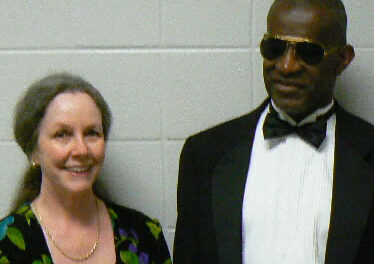In her first performance in Charlotte since a solo recital in February of 2006, the stunning pianist Olga Kern returned to the Blumenthal Performing Arts Center in grand fashion with a special group of guests, the National Philharmonic of Russia, under the baton of Vladimir Spivakov. Founded by the order of Vladimir Putin in 2003, this orchestra is designed to be a “cultural ambassador for post-reconstruction Russia.” Russians have always had the notion that if you send someone abroad to represent you, they’d better be the best. This has evidently not changed as they sent some of their finest classical musicians to Charlotte to give a concert steeped in the grand Russian tradition. The program was presened by Carolinas Concert Association.
I am accustomed to seeing orchestra musicians on the stage when I walk into a hall, tuning and going over passages individually. Then the concertmaster takes the stage and tunes each part of the orchestra before the concert begins. The National Philharmonic musicians did things a bit differently. They all took the stage together, took one swift tune up for the whole orchestra, and were ready to go. The concert opened with Romeo and Juliet Fantasy-Overture by Peter Ilyich Tchaikovsky. From the first chords it was easy to tell that a world class orchestra was in our presence; they held perfect balance and had impeccable clarity. The range of this group was outstanding: from the softest piano to the most powerful forte, they moved seamlessly. In the main development section of the second theme, the orchestra crafted a harried suspense using crescendos with symbiotic movement. The piece’s famous love theme was not as over-romanticized as some have made it, but it evoked images of unrequited passion nonetheless.
Kern joined the National Philharmonic for the next work on the program, Sergei Rachmaninov’s “Rhapsody on a Theme of Paganini.” One of the composer’s most famous works, it incorporates a theme by Nicolo Paganini into a set of virtuoso variations, all full of Rachmaninov’s signature melancholy and indelible Russian spirit. Kern had no technical difficulty here, which is not surprising considering the challenging repertoire she has performed and recorded in the past. Her hands moved with the grace of a ballet dancer; every motion was deliberate, nothing was pushed. There was something missing from this performance though. The”x” factor that a pianist needs to bring it home, and that I know Kern is capable of producing, was absent. I attribute this to the fact that she has been on tour for quite some time with the National Philharmonic of Russia. During this tour she has alternated between Rachmaninov’s Second Piano Concerto and the Rhapsody. As she draws near the end of this run, it is evident that the piece is losing its impact for her. It wasn’t rushed, but it was not hard to hear that she was just going through the motions. That said, Spivakov and his troops were again on point. The reentry of the orchestra in the Andante Cantabile was poignant. They gave Kern free reign to guide the performance yet came to life to create suspense when needed. It was because of them that this performance was brought to life and made passionate.
Closing the evening’s program was another work by Rachmaninov— his Symphonic Dances, Op. 45. The orchestra’s big sound and unified movement was well suited to this masterwork. They performed the second movement (Andante con moto (Tempo di valse)) with conviction and precision. Rachmaninov’s use of the Dies Irae from the Gregorian Mass of the Dead is recurrent in his works and is included, in possibly its greatest import form, in this piece. (It is also used several times in the aforementioned Rhapsody). The theme is brought in slowly, with ambiguous motifs that hint at the imposing doom while still clinging to a waning hope. Spivakov masterfully built up to the entry of the death chant in its full form with the brass section blaring the frightening tune. It was enough to give one cold chills and enough to earn an instantaneous standing ovation.
Typically, when world-class pianists such as Olga Kern comes to town to play with an orchestra, they own the audience and steal the show. In this case, however, the National Philharmonic of Russia was itself in the forefront and Kern took a backseat. In only its third year of existence this can already be counted among the world’s elite orchestras. It is scary to think what this group will be able to do with more experience together. I hope to hear them again in North Carolina.











